Photo

Trying to determine what a thick country accent on Vulcan would sound like through a translator.
Keep reading
22 notes
·
View notes
Photo

[Redacted Last Name] Family Shenanigans
27 notes
·
View notes
Photo
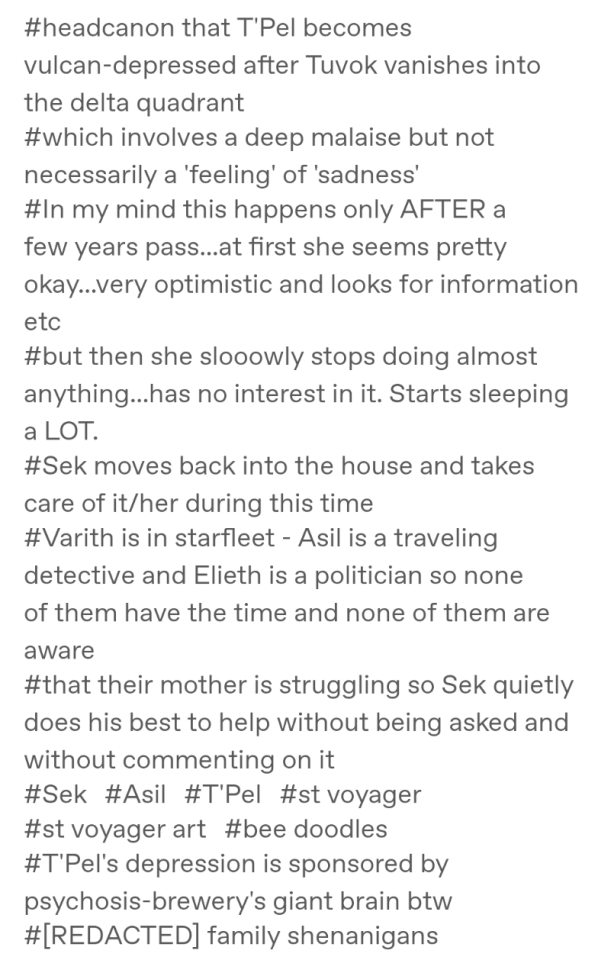


T’Pel Doodles
16 notes
·
View notes
Text
I think one of the big strengths of fanfiction as a medium is that it can, on average, assume the reader has a way higher degree of familiarity with canon than like…canon can. If you’re in the Star Wars AO3 tag you probably like Star Wars enough to remember more things about it than the average Star Wars-enjoying-ten-year-old. Which makes it way easier for fanwriter a to get to the juicy stuff and really engage with the worldbuilding or minor characters without having to spell out like. Who Wedge Antilles is for everyone who forgot or never noticed him in the first place. You could write a book about Wedge in the old EU because EU readers could also be assumed to be serious fans, but you can’t make a new canon Disney+ show about him. Those cost money to make and are intended for a broader audience.
And all this means that like. A good fic writer can and often will surpass canon when it comes to like. Thematic resonance and stuff, because they can really dig into something. Star Trek 2009 gave Kirk a new, more generic tragic backstory because it couldn’t expect the average moviegoer to be familiar with Kirk’s old, way more interesting tragic backstory. (Frankly, I’m not sure jj abrams knew about TOS Kirk’s backstory) whereas I have read a LOT of well-written, interesting, deeply resonant fanfic examinations of Tarsus IV, and what it means for Kirk’s character that he’s a genocide survivor. Star Trek 2009 answers the question “why did Kirk cheat on the kobayashi maru?” With “‘cause his dad crashed a spaceship when he was a baby.” A close examination of TOS canon implies the answer is “because he lived through a real-life Kobayashi that did have a win option, but which wasn’t taken.” BUT—and this is significant—even the TOS canon movies can’t really assume knowledge of the full TOS tv show, so that implication is never examined or made explicit. Instead it’s fanfic (and maybe spin off novels? Idk I’ve only read 2 trek books, if there’s one out there that covers this that would be really cool) where we get dives into that thread, where Kirk gets a commendation for original thinking because he can look a testing board in the eye and say “I’ve seen what happens when someone is entrenched in this kind of thinking, and I cannot let it happen to me. I understand the lesson, but it’s not hypothetical anymore and it never will be. I did what I had to do.” And that’s interesting! That’s meaningful! That can’t happen in a summer blockbuster. But it can happen in fic, easily, and that’s a strength of fic, I think.
18K notes
·
View notes
Photo
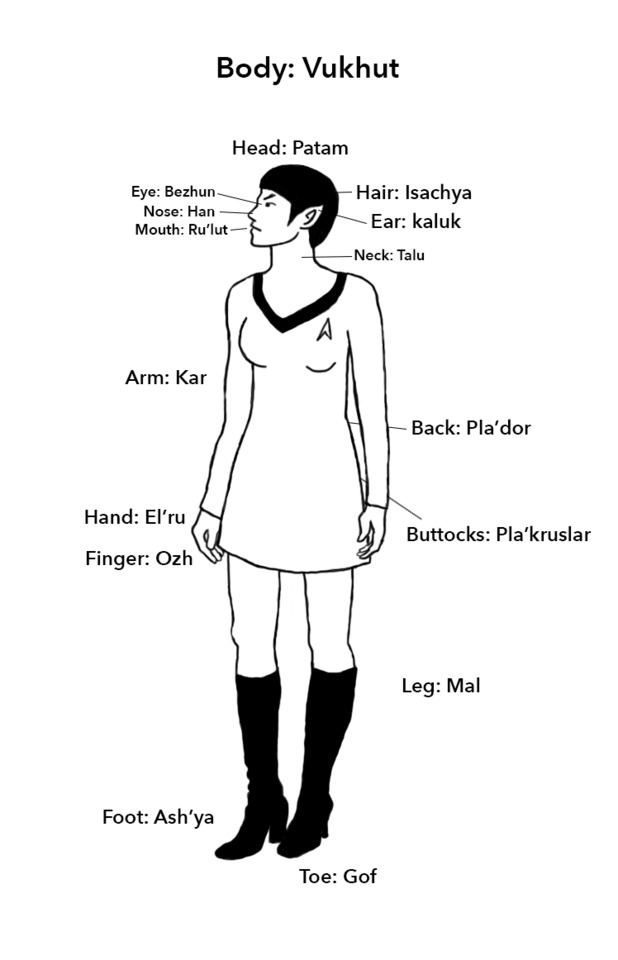
Here’s a chart and list of Vulcan words for basic body parts!
Body Vukhut
Head Patam
Hair (multiple strands) Isachya
Ear Kaluk
Eye Bezhun
Nose Han
Mouth Ru’lut
Back Pla’dor
Buttocks Pla’kruslar
Arm Kar
Hand El’ru
Finger Ozh
Leg Mal
Foot Ash��ya
Toe Gof
1K notes
·
View notes
Photo


Jadzia Dax, more alien-looking alien edition! Amphibious Trill: It Just Makes Sense. (Also, I already have a soft spot for salamander people.)
her belly is translucent, like a tadpole’s! You can see Dax curled up in there. Honestly, if you have a character with a symbiotic creature in their body and you don’t make it at least a little weird, what are you even doing?
8K notes
·
View notes
Text
vulcan‘s are impressed by capable, intelligent humans, for sure! They appreciate hard work and dedication, and admire the emotional control that humans at that level hold.
but
that dumbass over there struggling to tie their shoes while crying and eating a donut at the same time?
mate material.
1K notes
·
View notes
Text
as a mixed person… I have always been repulsed by narratives about spock/analyses of his behavior which paint him as someone ceaselessly divided between two cultures instead of a whole individual being pulled in different directions by the influences he’s been exposed to. framing his mindset as one with two separate and distinct halves oversimplifies his conflicts over how he should conduct himself (see: preparing himself for the kolinahr ritual for years (the original translation provided for the speech of the kolinahr master refers to ‘many seasons’) but neglecting to complete the final ritual at the last moment) and his conflict about expression regarding his interpretation of himself (which often involves an appraisal of himself as being overly revealing–for a vulcan–but through subtleties that only close friends (in this case bones) would notice–which is to say, behaving less overtly than a human). all is to say that spock, as we see him, is hardly the model of a vulcan. and while i maintain that he owes this distinction more to culture, the expectations within his personal relationships, and his contemplations of his place in society as a mixed person than to biological factors, there is something to be said about how individuals that are fully vulcan are raised, and what implications their instructions about composure, dedication to logic, and rejection of emotion have on their relationships with their spouses, children, and other loved ones…
which is why i am positively enamoured with tuvok.
tuvok and spock are not comparable, nor do i think there is much to be gained by drawing up similarities/dissimilarities between them and haphazardly chalking up their differences to distinguishments of humans/vulcans, with traits spock has alone being seen as implicitly and necessarily human and traits tuvok possesses that spock lacks demonstrating his being fully vulcan. (in fact, tuvok himself may not be considered by many vulcans to be an impeccable representation of their beliefs about personal behavior anyhow, and as a child even questioned the vulcan elevation of logic as the guiding force of life, saying in “Gravity” (5x03) “I refused to deny myself passion, the way you and men like my father do… If I was meant to deny feelings, why was I born with them? Where’s the logic in that?”) but i digress… the benefit in having such wonderfully rich, well developed characters such as them is in being able to analyze the tenets of vulcan philosophies and teachings that they provide us with, not to determine to what extent they themselves consistently followed them. that said, tuvok being fully vulcan changes his reception in vulcan society. he did not experience the same pressure spock did to ‘prove himself’ as a vulcan to both his family as well as others who were hesitant to accept a half-vulcan child, and this allows tuvok to serve as one illustration of a full vulcan child whose abilities to control his emotions and act logically are never doubted (though his behavior is occasionally called in to question)
but as you contemplate the nature of vulcan behavior, their methods of understanding the world, and how they educate their children, one particularly interesting aspect of their culture which arises is the consistent demonstration of long term committed relationships (in this context–specifically familial or spousal/sexual) which are unemotional.
in tuvok, these unemotional relationships which demonstrate his vulcan upbringing most clearly are between himself and his children. based off of his interactions with the crew of voyager and the individuals they meet on their journey home, we learn about how vulcan relationships function, what vital elements take the place of love, and what the definition of love is by reduction rather than explanation: with the dedication, longing, and attachment to his family that tuvok speaks of and demonstrates not being considered aspects of an emotional love
excerpts from Star Trek: Voyager, “Elogium” (2x04)
TUVOK: … I must point out that, as illogical as it seems, being a father can have infinite rewards. Far more than would seem possible. My children occupy a significant portion of my thoughts. Now more than ever.
NEELIX: I-I-I’ve heard it said that children can bring a lot of joy into one’s life.
TUVOK: I experienced neither joy nor sorrow, but I do believe it is possible.
…
TUVOK: I have three sons and one daughter. I can assure you she benefits as much from my presence and guidance as my sons do. It is unfortunate that I must be so far removed from all of them now.
from this, it can be determined that: 1. tuvok thinks about his children. (this may seem obvious, but in actuality, it’s quite an… unproductive pursuit. stranded in the delta quadrant, years away from them, there is nothing to be gained from tuvok spending his time contemplating his children, and how they are faring so far away. if it is as he says to samantha wildman in “Once Upon a Time” (5x05), and he is confident in the wellness of his children given the company they are alongside, tuvok should be satisfied with his knowledge of their safety and accepting of his inability to change his position to be with them.
one of my personal favorite vulcan words is “kaiidth”, which translates approximately to ‘what is, is’ in federation standard. (“when one accepts what cannot be changed, one begins to think like a vulcan.” - TOS novel: Dwellers in the Crucible). though i occasionally think this saying imparts too great a notion of passivity as a function of logic onto vulcans, i interpret this statement generally to be one which permits movement forward, but which does not erase wandering. in my mind, tuvok can both worry for his children (though such worry is illogical because he could not intervene in their lives to protect them if there were cause to worry) and he can resolutely and determinately perform his duties on voyager. perhaps isolating love and affection for his children (which he does feel, but does not experience regularly due to his repression of emotions and of their influence over him) from his worries about them allows for him to function adequately: grants him the ability to work as voyager’s security officer without encumberment from heartache and longing that the human members of the crew experience for the lives and people left behind in the alpha quadrant.
nonetheless, I persist in imagining thoughts of his children pervading tuvok’s mind even as he meditates. i imagine he wonders idly what they are doing at particular moments in time, what reflections asil has on the reading she’s been assigned at school, if sek searches through his memories of him as he navigates his own path as a father for the first time..)
this quote also demonstrates the position tuvok takes relative to his children, object 2 taken from this interaction being that some of the core values of vulcan parenting are presence, by tuvok explaining his regret that he cannot be with his family now and *guidance, by expressing his belief that his daughter would benefit from the wisdom and insight he could offer her were he present in her life (these two components existing in place of “mere” affectionate love).
*another note on guidance, an excerpt from a verse in “Falor’s Journey”, an epic story about a Vulcan merchant which tuvok’s youngest son would ask him to play for him on his lute, from Star Trek: Voyager, “Innocence” (2x22)
“He traveled through the windswept hills
And crossed the barren Fire Plains
To find the silent monks of Kir.
Still unfulfilled, he journeyed home
Told stories of the lessons learned
And gained true wisdom by the giving.”
it becomes clear in the lyrics of this verse that wisdom is prized on vulcan, and though information (such as that which was communicated to Falor in Kir) can be relayed, processed, and internalized, the richness of experience and interaction with others is what contributes to enlightenment. this forms the basis of tuvok’s relationship with his children, and as a father he is characterized by his wish to provide counsel and direction to his children. guidance, thus, can be seen as one of the hallmarks of vulcan relationships as a principle which takes the place of what humans might see as constituting love (things such as affection or fondness)
an excerpt from Star Trek: Voyager, “Innocence” (2x22)
“ELANI: If Vulcans don’t feel anything, does that mean you don’t love them?
TUVOK: My attachment to my children cannot be described as an emotion. They are part of my identity, and I am incomplete without them.
ELANI: I bet they miss you too.”
these lines constitute some of my absolute favorite bit of communication delivered in all of star trek. this single statement raises countless questions about the nature of vulcan relatedness and connection (some literature suggests that vulcans feel significantly deeper than humans do, with this increased intensity being the reason for the vulcan reformation and movement toward logic as the dictating factor for behavior in place of emotion. tuvok saying that his attachment to his children cannot be described as an emotion suggests that a labeled emotion is too simple a term for his relationship with them, yes, but does it also imply that there is a greater emotional bond that binds them so closely together and so fervently that it surpasses what can be considered an emotion? what could something like this be described as? how could it be represented?) this statement brings in a discussion about familial bondings, with tuvok possibly feeling incomplete without his children because of their telepathic link to one another: the constant feeling of their presence in his own mind forming a feeling of familiarity and self. finally, and most pressingly, this statement indicates tuvok’s self identification through another, his identity as a guardian, parent, and caretaker to his children contributing to his own notion of self
excerpt from Star Trek: Voyager, “Caretaker” (1x01)
JANEWAY: I spoke to your family before I left.
TUVOK: Are they well?
JANEWAY: Well, but worried about you.
TUVOK: That would not be an accurate perception, Captain. Vulcans do not worry.
JANEWAY: They miss you.
TUVOK: As I do them.
finally, tuvok identifies yearning as an integral component of vulcan relationships (though in my mind, I imagine this longing to be with his family as a less emotional appraisal of the term than may be expected… data’s explanation of friendship from Star Trek: The Next Generation, “Legacy” (4x06) “as I experience certain sensory input patterns, my mental pathways become accustomed to them. The inputs eventually are anticipated, and even missed when absent.” comes to mind…)
as I was talking about this with joe tonight, and wondering what possible motivation tuvok (and all other vulcans with similar familial connections like his) has to miss his family, to see himself as incomplete without them, and to worry about them if not for love, he said: “I read somewhere that when you mourn someone, you are actually mourning what they were to you: a source of comfort, an occasional friend, a companion in difficult situations, etc. … if relationships are actually vaguely transactional like that, maybe that’s what love is, a type of relationship where you’re willing to give someone more and more just to continue to be around”, which was excellent and not something that i’d considered
are enduring vulcan relationships (like marriages/bondings) transactional? is a spouse another source of income, a companion with which to speak about the events of a day (another voice of reason to temper confusion with/someone to provide more context/another perspective on personal matters of choice to guide their partner to the most logical conclusion)? is it possible that their absence is felt only as the absence of an intellectual equal? the absence of someone raised with a similar background who possesses the experiences necessary to understand their spouse’s guiding principles, or someone of a different background capable of adding nuance and other points of consideration into ethical/moral/behavioral debates?
certainly transactional relationships could account for the statements made by tuvok in these examples. it is possible that he thinks of his children and that he considers himself incomplete without them because they are a part of his identity: it is possible that because their existence put him in the position of a teacher and a caregiver (providing for their educational, dietary, social needs), their absence deprives him of exercising a portion of himself reserved for their exclusive use, and that because he is a father to them, he is not one without them. but then… how can he worry for them if not by love? and if he does not worry for them by reason of love, what drives him to worry for them? that concern he speaks about, i think, cannot be transactional. he gains nothing by worrying for them, nor do they gain anything by worrying for him, and yet they persist in worrying.
despite all the intricacies shown and questions raised by tuvok’s relationship with his children, i think perhaps that the most complete and thorough illustration of the effect of vulcan cultural upbringing on formed relationships comes not from tuvok (whose discussions of connectedness in this context are limited to other vulcans who have been raised in the same disciplines that he himself grew up in) but from t’pol, in how she presents layers of reserve, objectivity, emotionalism, and subjectivity in relation to commander tucker.
despite both being full vulcans who have had all the privileges that label entails (being free from persecution/rejection from peers based on their heritage, unlike spock) the separation between tuvok and t’pol is immense, and lies (to me, most importantly,) in the relationships they form with their bondmate. tuvok’s relationship with t’pel is characterized by their mutual evenness, regard for each other, and complement. they have been married for 67 years by the events in “Caretaker” (1x01), and have raised four children together in that time. they are familiar with each other, well established presences in the lives of the other, and have at this time been exposed to, processed, and settled into their spaces in each other’s lives, understanding well how they work together to create a harmonious shared life. trip and t’pol… are a young, dumb mess.
trip and t’pol’s relationship owes about half of its instability to forces beyond their control (the inherent complications of establishing a relationship “in the workplace” and struggling to determine what types of behavior is appropriate between them, hostile alien species attacking their ship, having their genetic material stolen from them in a plot to bring prejudice and fear mongering to earth… just for starters) and the other half of its instability to their own internal conflicts (encompassing death of a family member, spiritual conflict, and the navigation of a cross-cultural, cross-species relationship). and yet despite the challenges they face, the dangers they’re put in, and their own missteps, they gravitate toward each other consistently, inconveniently, always.
but my favorite interaction of thiers, and the one which persists in my memory as one of the most characteristic (and most frustrating) illustration of their relationship is their shared scene at the conclusion of Star Trek: Enterprise, “Bound” (4x17).
because the pretense–all their numerous and pressing difficulties–splinter–in an instant–and fall away. it is the first time t’pol makes herself vulnerable, admits that she believes trip’s guidance is imperative to the success of their mission. it is the first time she swallows her pride and her feigned objectivity (concern for the good of the entire crew) and allows herself not to make a personal request–but to tell trip explicitly, and without reserve, that she would have him stay, if he would. that his presence is what she wants for herself (not his expertise on behalf of the crew). t’pol is speaking to trip for herself for the first time, their newly formed telepathic bond serving as an impetus for her expression: the feeling and image of trip in her own mind (and vice versa) contributing to an irrefutable knowledge both of their compatibility and of their perceptions of each other (through each other).
the previously identified components which contribute to vulcan relationships (as taken from tuvok) are presence, guidance, self identification through the other, and yearning, the most logical and explicable of these is guidance, a means of which to steer another toward logical behavior. presence, self identification through the other, and yearning, are, however, more inexplicable with tuvok having difficulty admitting in one instance that he does, in fact, miss his family, and in another finding it difficult to express in what manner/how he is “incomplete” without them: these being things which to him are so natural and forthcoming that they defy explanation, and are “beyond” emotional language.
t’pol, in bound, asks not for the more logical pillar of dedication. she does not ask trip to say because she feels she is in need of his guidance, but asks him to be present with her, because they are bound together, and because she has missed him.
this all culminates in an appraisal of love. if vulcans feel love, but choose not to experience it by repressing their emotions, i needed to understand how their relationships could function and persist in the absence of what i believed was such an integral component of relationships (though as I wrote this post, it occured to me that the definition of love i was working under became more nebulous, and increasingly difficult for me to define). i could not fathom, as i thought of all the vulcans i’d watched and read about, what bound them so indelibly to others. all of the logical forces i could think of–politics, financials, diplomacy, reproduction, and other mutual benefits–fell short, and there persisted something in the thrum of them–the vibration of that string that binds t’hyla together. after all, i began this investigation wondering “what is love if not attachment? longing? attention? and if these things are aspects of love that vulcans can exhibit, what is left that they object to?” what i found was a definition of love for vulcans which was not primarily characterized by affection, and which did not begin at that point, but which was founded upon recognition, acknowledgement, and behavior that seeks to maintain wellness, promote wisdom, and encourage reflection in another.
#ckiewe#voyager#ent#spock#tuvok#trip/t'pol#vulcans#vulcan culture#long post#this is SUCH an amazing analysis
156 notes
·
View notes
Note
Punk Deanna Troi, please!
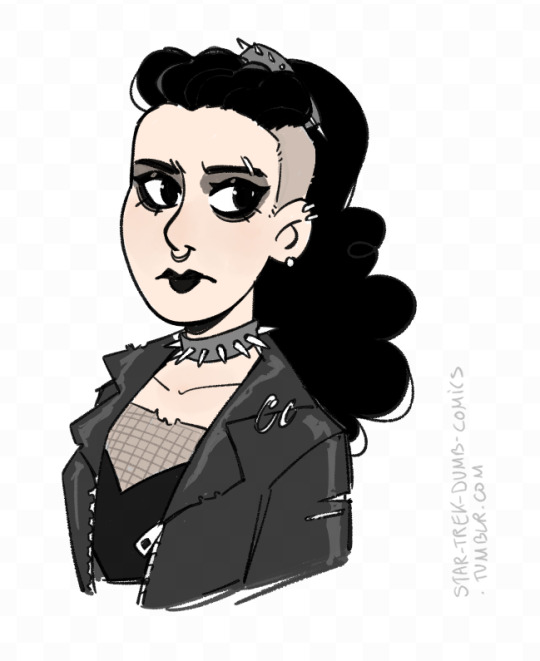
Oh you're feeling sad ? Too bad. Fuck you
360 notes
·
View notes
Text
I don’t know how to describe it but everytime I see one of those “Hey so we X’d your boyfriend in the X and now he’s X…yeah he’s absolutely X, nothing we can do, sorry” memes I immediately think ‘Janeway sent this to T’Pel’
#ckiewe#voyager#tuvok#prev tags#hey so we fused your boyfriend in the transporter and now he's merged with neelix...#yeah he's absolutely tuvix#nothing we can do sorry
40 notes
·
View notes
Text
note to self
"nae" is analogous to "n't"
didnae - didn't
isnae - isn't
dinnae - don't
disnae - doesn't
so you'd say "it don't" matter, you say "it doesn't"
it disnae matter
522 notes
·
View notes
Photo
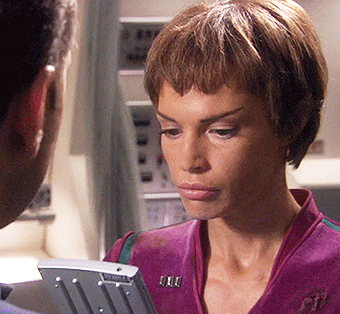


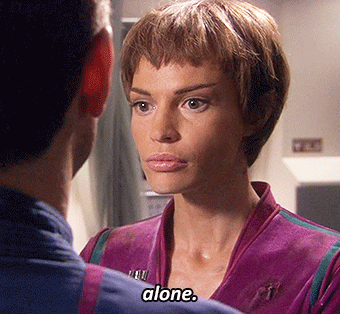
#ckiewe#ent#trip/t'pol#prev tags#T'Pol: Vulcan couples live together for a year after being married so they can bond#Also T'Pol: Vulcans don't have honeymoons so I went to the mountains to think about my sad little life. Alone.#@ Koss if she's YOUR girl why did she kiss my cheek at your wedding and then go to Mt Seleya to meditate??? (alone)#Trip please...those bangs SCREAM distress....you just know she's in a bad place rn#bathroom scissors cut
170 notes
·
View notes
Text
i live for reading spirk fics which compare jim to water. Not in like a clingy ass ‘i need you in order to survive’ way but in like a ‘you refresh, soothe, and quench me’ way. A kind of thirst that is not akin to one parched in the desert, but the kind one gets after a long workday and immediately feels better after a long cold drink. You had water that day, but nothing compares to that one cup of water that lets you know you can rest. Like Jim innately touches the part of Spock that knows he needs to be human sometimes in order to be himself, and that kind of self-healing, of learning to be both his halves…it lets Spock know he can rest from his struggles for a bit.
Most people would make a fuss about this, how Vulcans save precious water and need it to survive, how Jim is like that. Thing is, Spock is perfectly capable without him for a while. He just doesn’t want to be. He can captain a ship, can meditate, can do so many cool things without needing Jim to reassure him. BUT. He enjoys Jim’s presence. That a relationship for him is not a need but a deep want is something that water parallels in a way. Too much water can make you sick, but enough…just enough to make you comfortable is a soothing, relaxing experience. The games of chess, the way Spock keeps coming to Jim as one would to a cold water bottle on the nightstand.
He is water, but not for thirst. He is water to refresh.
172 notes
·
View notes
Text
Broke: vulcans don’t play games, as they are illogical
Woke: vulcans absolutely play games as resting so as to recuperate after exertion is highly logical and they have a marked preference for the Terran game, chess
Third eye slaming open at 4:27am: vulcans love poker. They won’t mention it and they’ll justify it but after first contact they descended on poker like a murder of starving ravens as a unified cultural phenomenon
52K notes
·
View notes
Text
As a side note… I am really annoyed by one thing about Star Trek.
“Replicated food is not as good as real food.”
That’s ridiculous. In Star Trek, replicator technology is part of the same tech tree as transporters. Replicated food would be identical to the food it was based on, down to the subatomic level.
#ckiewe#long post#trek lore#this is a very unwieldy post#theres even more gems in the notes so go check that out
46K notes
·
View notes
Text
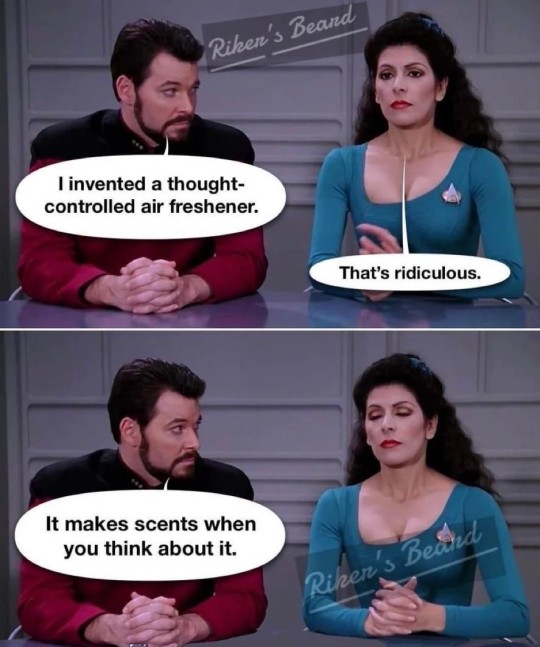
Posted in r/startrekmemes by u/capt_irk: link
232 notes
·
View notes